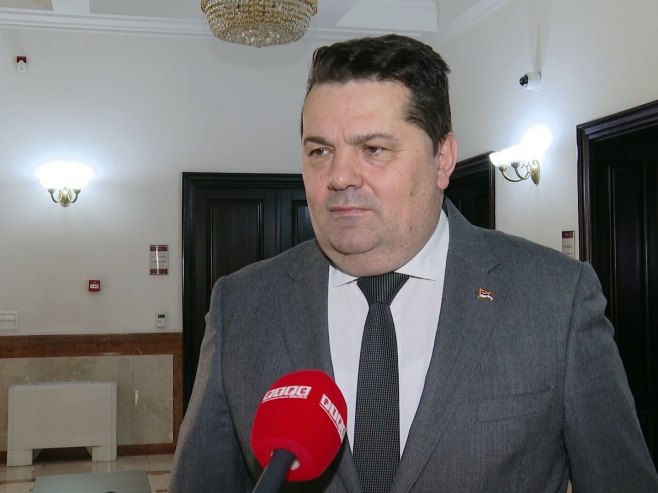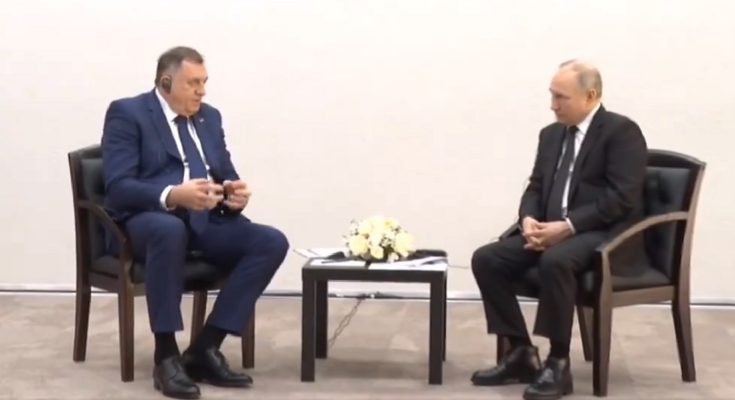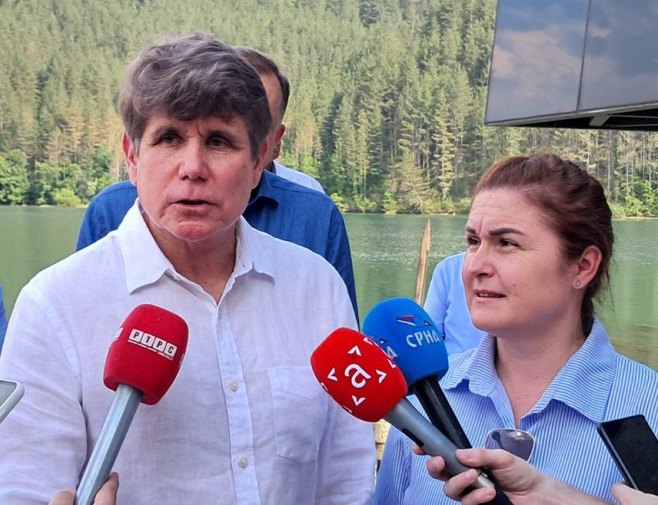The two announced referendums in Republika Srpska reflect our stance toward President Milorad Dodik and respect for the Constitution, particularly the article that defines that the president can be removed only by a referendum through the will of the people, or by resigning, said Nenad Stevandić, President of the National Assembly of Republika Srpska, in an interview with Sputnik.
In any case, he added, the president of Republika Srpska cannot be dismissed by an election commission that issues certificates but does not conduct elections.
Constitutional crisis in BiH as a consequence of a colonial mindset
“This is, in fact, a constitutional crisis caused by Christian Schmidt and his proclamation of laws, instead of them being adopted in parliament. Those who accepted his proclamations as valid laws, and who then try people like Mr. Dodik under them and send them to prison, are the ones who introduced instability and constitutional crisis into BiH. That is where the root cause lies.
Our responses have so far been mostly defensive, and we will continue along those lines. We believe the majority of the public is on our side and that the European public is slowly maturing as well, because nowhere in Europe would they ever allow in their own country for one man to proclaim a law that sends another man to prison. If they wouldn’t tolerate it at home, it is strange that they impose it outside of Europe for geopolitical reasons. This is more a result of a colonial mentality than of a civilized achievement,” Stevandić said.
He noted that a part of the opposition sees in this damage to Republika Srpska their opportunity, but their influence among the people is completely negligible and irrelevant to future developments.
Skillfully avoiding conflicts into which Bosniaks try to drag us
“The doors to compromise are always open, and the leadership of Republika Srpska has repeatedly shown that it never seeks to jeopardize peace in BiH,” Stevandić emphasized.
“We do not want the people to be pushed back onto the path of conflict. But the fact remains that BiH has already been monoethnic across its regions for over 20 years, where only some institutions remain multiethnic, bringing together representatives of different peoples.
So, I believe the only way forward is either to stick strictly to Dayton—meaning that what one people does not accept cannot be imposed on them by another, regardless of the stance of foreigners, the ‘high representative,’ or anyone else. The same applies at the entity level: what one entity does not accept cannot be forced upon it by the other. Only in this way can BiH remain in balance, where citizens realize their rights within their entities and within such a BiH based on mutual respect.
But to be honest, by accepting interventionism and violations of the Dayton Agreement at the expense of Serbs, the Bosniaks have entered a dangerous game, constantly trying to drag us into conflicts—conflicts which we have so far skillfully avoided,” Stevandić said.
According to him, the United States has shown a different attitude toward Republika Srpska in the past six months:
“If the verdict had come during the Democratic administration and under former ambassador Murphy, he would have already ‘entered Banja Luka on a tank.’ But now, the American administration and its embassy in BiH are maintaining equidistance, which means they understand the processes here. For now, we are satisfied with that,” Stevandić concluded.
BiH on the edge of the abyss
Political analyst Anđelko Kozomara believes that BiH is entering the biggest constitutional crisis since 1995, stressing that the country has never before been so close to the abyss as it is now, due to unconstitutional decisions—primarily those of the “high representative” and the Constitutional Court, which is controlled by foreigners.
“The fact is that this crisis has been imposed by Western powers led by the UK and Germany, since their ambassadors have been managing it ever since the infamous Michael Murphy, the American ambassador, left BiH in January. A new ambassador has not yet arrived.
They are pushing with such force and energy to reduce Republika Srpska to just a territorial segment of BiH, stripped of the essential state attributes it received under Dayton. Republika Srpska has its territory, its population, its authorities, and its political administration with all the competencies that any other state possesses,” Kozomara stressed.
However, at this moment, Christian Schmidt and the Sarajevo political establishment appear to be much stronger than Republika Srpska, Kozomara warned, because they have the backing of such powerful Western forces.
Extremist Bosniaks propose their own referendum
“For that reason, the most extreme Bosniak political circles are now proposing a referendum in Sarajevo on abolishing the entities and creating a unitary BiH,” Kozomara added.
“Of course, we know how such a referendum would go in the Federation—almost unanimously in favor. But such a referendum carries a great risk of conflict, potentially repeating 1992. However, there are strong NATO forces present—over 4,000 soldiers in BiH—who are very operational and could quickly increase their numbers. They would not allow a conflict of larger proportions. Smaller, isolated incidents are possible, but a war on the scale of 1992 is, in my view, impossible in today’s circumstances,” Kozomara concluded.
Referendums in Republika Srpska
The situation in BiH is becoming increasingly complicated, and two referendums in Republika Srpska could be organized as early as this year—one in September, and the other toward the end of the year.
As explained by President Milorad Dodik, the September referendum would allow the citizens of Republika Srpska to vote on the verdict of the Court of BiH against him. If, even after that, there is no political agreement at the BiH level and no “return to the Dayton Agreement,” then within 90 days, a referendum on the Autonomy of Republika Srpska will be held.
Source: RTRS









